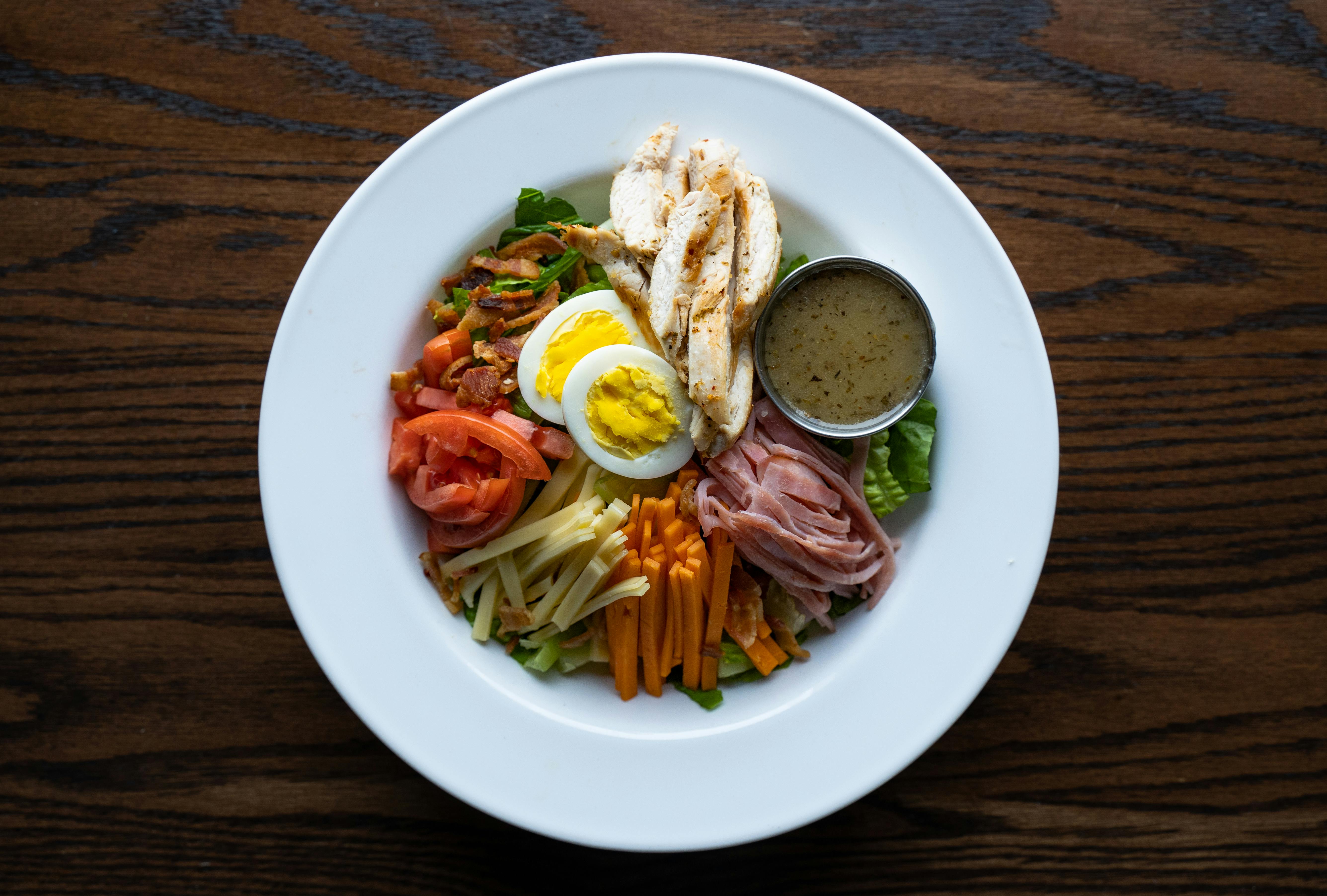Cobb Salad Calories: Chick-fil-A Facts
When it comes to a balanced meal that combines taste with nutrition, the Cobb Salad stands out as a popular choice. Packed with ingredients like chicken, bacon, avocado, eggs, and a variety of vegetables, it offers a substantial nutritional profile. A traditional Cobb Salad with dressing contains about 623 calories and 43 grams of fat, which makes it a hearty meal option.

When it comes to a balanced meal that combines taste with nutrition, the Cobb Salad stands out as a popular choice. Packed with ingredients like chicken, bacon, avocado, eggs, and a variety of vegetables, it offers a substantial nutritional profile. A traditional Cobb Salad with dressing contains about 623 calories and 43 grams of fat, which makes it a hearty meal option.
For those monitoring their caloric intake, there's an alternative. A Cobb Salad from Chick-fil-A, for instance, includes 520 calories with 28 grams of fat, 28 grams of carbs, and 41 grams of protein, providing a slightly lighter option without sacrificing flavor. Ordering a Cobb Salad with more vegetables and less dressing can also help reduce caloric content.
Comparing various versions, it's evident that the nutritional values can vary. By considering options from different establishments and customizing ingredients, individuals can make informed decisions that align with their dietary goals. Whether opting for the rich and filling traditional salad or a leaner version, the Cobb Salad caters to diverse nutritional needs and preferences.
Nutritional Breakdown
Understanding the nutritional components of a Cobb salad can help in making informed dietary choices. This section delves into the caloric content, macronutrients, micronutrients, and additional nutritional factors.
Caloric Content
A standard serving of Cobb salad typically contains between 500 to 700 calories. The caloric count can vary depending on the specific ingredients and their quantities. For instance, a traditional Cobb salad with dressing can have around 623 calories. Components like chicken, bacon, and blue cheese contribute significantly to the calorie count.
Macronutrients
Protein: Protein sources in Cobb salad include chicken and boiled eggs, contributing roughly 57 grams of protein per traditional serving.
Fat: The salad provides a significant amount of fat, approximately 43 grams, including healthy fats from avocado. The fat content includes saturated fat and potentially some trans fats from the dressing and bacon.
Carbohydrates: Carb content is relatively low, usually around 12-15 grams per serving, making it a suitable option for low-carb diets. Fiber content, mainly from lettuce and tomatoes, adds to the carbohydrate profile.
Micronutrients
Vitamin A: Found in lettuce and tomatoes, contributes to the salad’s vitamin A content.
Vitamin C: A traditional Cobb salad contains around 25 milligrams of vitamin C, primarily from vegetables like tomatoes and lettuce.
Calcium: Blue cheese adds a notable amount of calcium, benefiting bone health.
Iron: Chicken and greens contribute iron to the dish, promoting healthy blood circulation.
Potassium: Avocado and tomatoes provide potassium, essential for heart and muscle function.
Additional Nutritional Factors
Cholesterol: Due to ingredients like eggs and bacon, the cholesterol content can be higher, often requiring attention by those monitoring their cholesterol intake.
Sodium: Processed ingredients such as bacon and blue cheese elevate the sodium levels, which can be a concern for blood pressure.
Sugar: The salad contains minimal sugar, mostly from fresh vegetables, making it a healthier option in terms of sugar content.
Adding more veggies can enhance the fiber content, while adjusting the dressing can reduce calorie and fat intake. Customizing portions of ingredients like chicken and bacon can alter the nutritional profile to meet specific dietary needs.
Comparative Analysis
Examining different variations of Cobb salad, alternative ingredients, and portion sizes reveals important factors that influence its nutritional content and flavor profile.
Cobb Salad Variations
Cobb salads come in numerous varieties, each with distinct ingredients and nutritional benefits. A standard Cobb salad, featuring grilled chicken, bacon, blue cheese crumbles, avocado, and ranch dressing, can pack around 400-700 calories. Some versions incorporate grilled turkey or turkey bacon as lighter alternatives to traditional bacon.
Restaurants like Chick-fil-A offer options such as grilled nuggets or Chick-n-Strips instead of grilled chicken. Customizations can significantly affect total fat, especially with additions like vinegar-based dressings, which are lower in calories compared to creamy dressings.
Alternative Ingredients
Substituting ingredients can transform a Cobb salad’s calorie count and nutritional profile. Replacing bacon with turkey bacon, for instance, reduces total fat while maintaining flavor. Switching blue cheese crumbles with feta or leaving out cheese altogether is another way to lower calories.
Adding more veggies such as onions, peppers, and other vibrant vegetables can enhance fiber content and vitamin intake, like Vitamin D. Choosing a low-calorie dressing or making a homemade vinaigrette with olive oil and vinegar instead of a traditional ranch dressing significantly alters the nutritional facts. Mustard-based vinaigrettes also offer a flavorful yet lower-calorie dressing alternative.
Portion Size and Servings
Portion size plays a crucial role in managing calorie intake from Cobb salads. A standard portion at a restaurant might be larger than a homemade serving. A typical serving can range widely in calories, from as low as 400 to upwards of 700, largely dependent on ingredient quantities.
Ensuring a satisfying meal without overindulgence involves balancing ingredients and mindful serving sizes. For example, limiting avocado to a few slices and measuring dressing to two tablespoons can maintain a healthier profile. Smaller portions with high-protein ingredients like grilled chicken or grilled turkey contribute to satiety without excessive calories.
Want more posts like this?Sign up for our FREE newsletter →